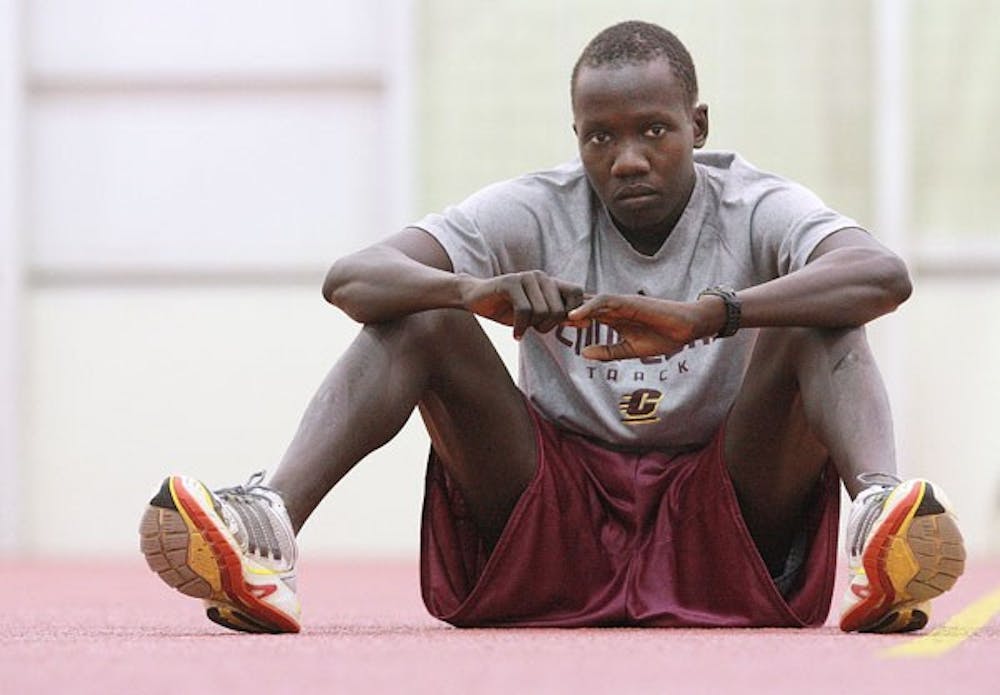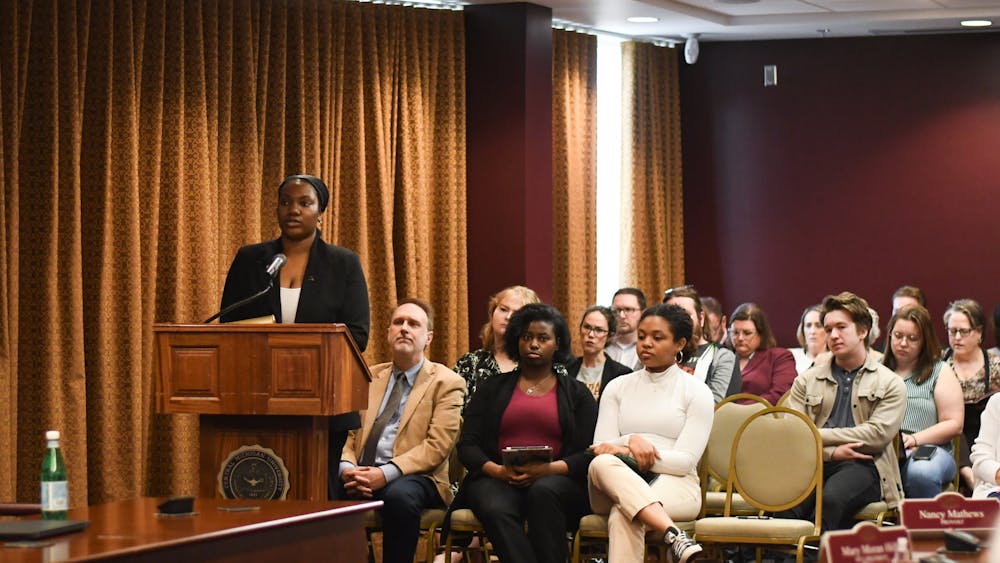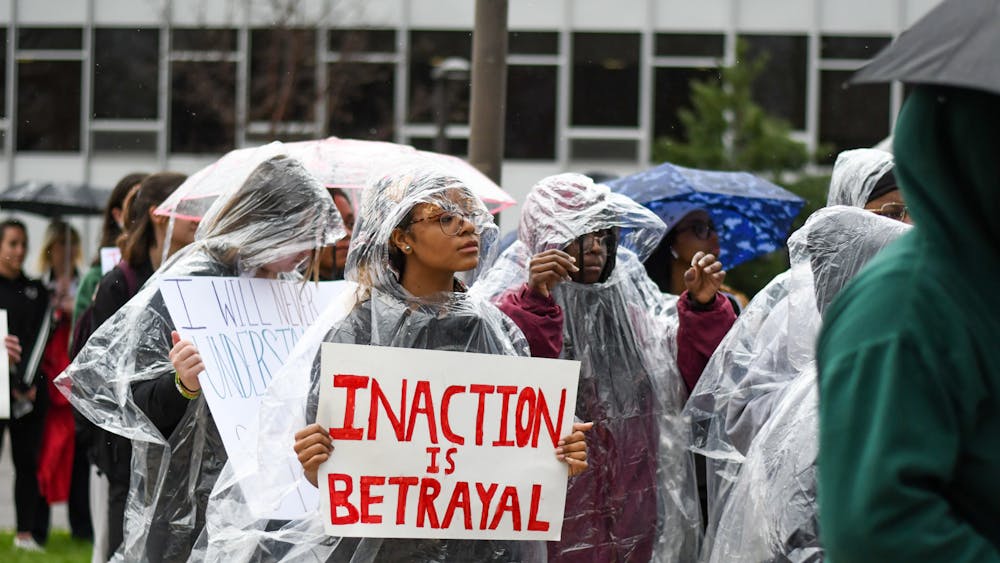Running for refuge

Riak Mabil will never forget the night of Dec. 19, 2000.
At the age of 13, Mabil, along with three of his siblings, arrived to the United States as refugees from northern Kenya.
“I remember it being very cold outside when I got here,” said the cross country and track and field athlete.
Mabil was born on Jan. 1, 1987, in the Duk village of the Jonglei state in southern Sudan, a nation torn ever since the early 1980s.
When Mabil was four years old, he was displaced following a clash between the northern and southern Sudanese governments.
“I don’t know how I made it out alive; I remember seeing someone get shot,” he said.
The government, in opposition of a coup attempt by the Sudan People’s Liberation Movement, led a massacre of Bor, the Jonglei state capital. The fighting left tens of thousands of civilians dead and thousands more the victims of famine.
“We only ate like once a day over the course of a couple months,” Mabil said.
The escape
In November 1993, Mabil’s father, Aquila, took Riak’s mother, Nyadeng, and five of his eight siblings – Aduk, Monyok, Yom, Mathiang and Aleer – to Lakes, a neighboring state west of Jonglei, to escape the bloodshed.
“My dad was a Sudan People’s Liberation Army official based in Warrap (state) and he came and took us after we survived the massacre,” Mabil said.
Mabil left in early 2000 for the Kukuma Refugee Camp in northern Kenya, where he met up with sister Aduk. At the camp, he met older brothers Jacob and Mawut, and sister Nyaring, for the first time.
“My older brothers were part of ‘The Lost Boys’ who left home in 1987, so I never got to meet them until I came to Kakuma,” Mabil said.
The Lost Boys of Sudan was the name given to the 27,000-plus orphaned boys during the civil war from 1983 to 2005, when the fighting came to an end.
Mabil’s parents remain in southern Sudan today. He has not seen them since leaving northern Kenya in 2000, but talks to them on the phone on occasion.
“They’re happy that I’m going to school here — that’s the main thing,” Mabil said.
A new life
Change came quickly for Riak as the Lutheran Social Services of Michigan placed him and his three siblings — 17-year-old brother Jacob, 15-year-old sister Aduk and 12-year-old sister Nyariing — with a foster care family in Charlotte, Mich. There, he enrolled for the eighth grade spring semester and began his high school career at Charlotte High School.
“It was different (the atmosphere), but we all got along,” he said. “The first couple days of school were difficult; not knowing where to go, but a lot of kids were willing to help.”
Tom Sneckenberg, Charlotte High School football coach and Mabil’s cross country/track and field coach during the 2002 and 2003 seasons, said Mabil’s willingness to work and prove himself made him stand out.
“He was one of my best runners, even as a freshman,” he said. “His work ethic was such; the kids never doubted his ability … and he proved that time in and time out.”
Mabil lived down a dirt road in the country and would run in or ride his bike miles to school most of the time, Sneckenberg said.
Finding success
Social services moved Mabil halfway through his sophomore year to Grand Ledge, where he attended Grand Ledge High School.
Things did not click right away, though.
“He was extremely shy at the beginning, but he became more outgoing as he continued on in sports,” Lutheran Social Services caseworker Sally Campbell said.
Grand Ledge cross country coach Kim Spalsbury runs a team-based program, something Mabil clashed with in the beginning.
“He excelled from day one with us, but it took a little while before we could get on the same page training-wise,” he said.
It did not take very long before Mabil experienced success, however. He went on to become a three time all-state performer and currently holds the school record in cross country (15 minutes, 48 seconds), Spalsbury said.
“By the time he reached his senior year, he was accepted and well known at Grand Ledge,” Spalsbury said.
His success brought on looks from several different schools in Michigan, as well as Minnesota and Indiana, including a scholarship offer from Eastern Michigan, Mabil said.
“I’m incredibly proud of him,” Campbell said. “I feel so blessed to be able to watch and participate in his life. I think I’ve learned more from him than he has from me.”
Coming to CMU
Mabil’s decision to come to CMU was made after attending the Mid-American Conference Indoor Track Championship the school hosted and won in February 2005.
“It was electric in the building and I wanted to be a part of that,” he said. “We have the MAC Indoor Championships this February so, hopefully, I can do something to help the team and make it feel like February 2005 all over again.”
Mabil also attributes friend Abraham Mach, who ran for the team from 2006-08, as another variable that attracted him to Mount Pleasant.
“He’s from the same part of southern Sudan as I am and our story is basically the same,” Mabil said. “He went to East Lansing High School and our schools were rivals so, when he was here, it made me want to come here, too. He was really good and I wondered what it would be like to be on the same team.”
Since coming to CMU in 2006, Mabil has competed in cross country, indoor and outdoor track and field consistently since the 2007 season. He was named second-team all-conference for cross country last season and MAC Indoor Track and Field Champion in the 5000m last spring.
Director of cross country/track and field Willie Randolph said Mabil’s life experience has allowed him to grow as a person.
“It’s an opportunity for other athletes to really understand what hard work, dedication and focus really means,” Randolph said. “Coming from the environment he came from and the experiences he’s had, you really can’t say anything about it unless you’ve experienced it yourself.”
Looking back, Mabil said his youth as a refugee made him a stronger person.
“Where I’m from is a place where little boys become grown men at a young age,” he said. “I saw a lot of things a little child should have never seen.”







